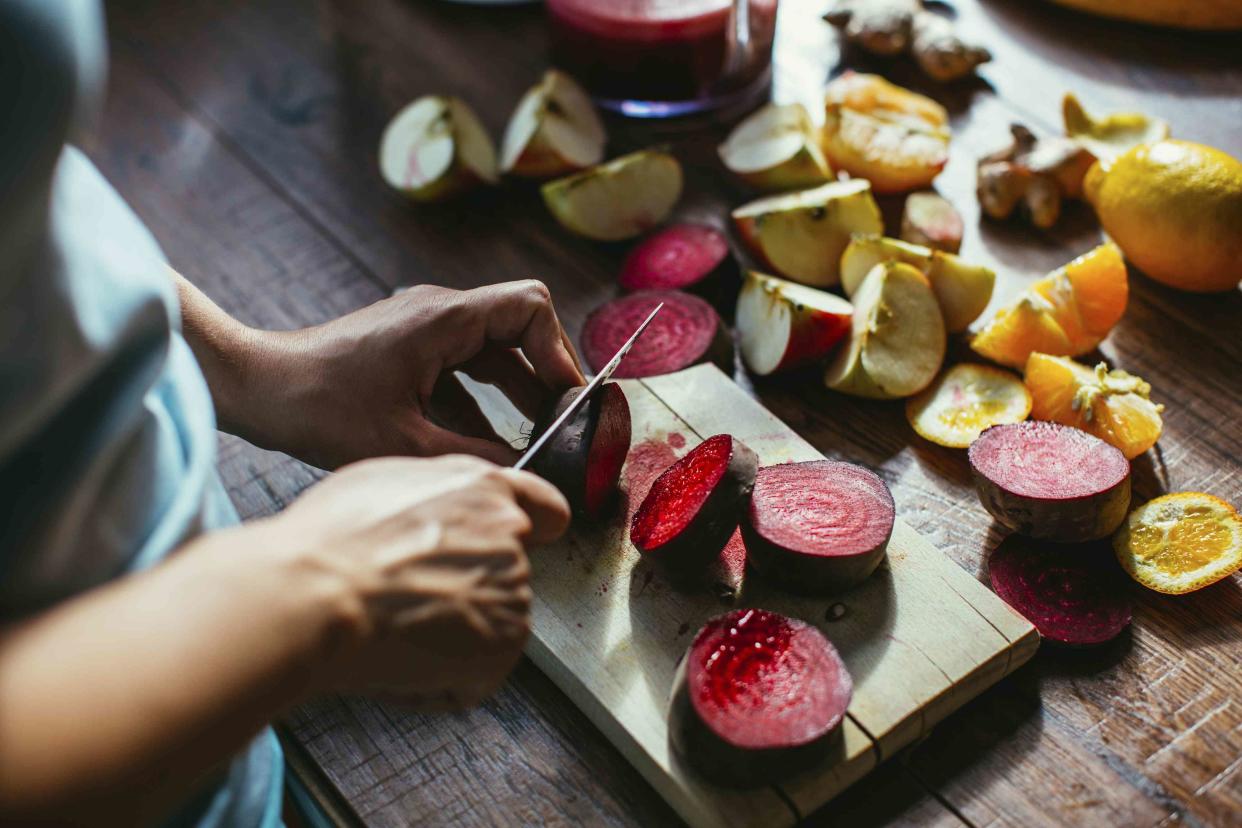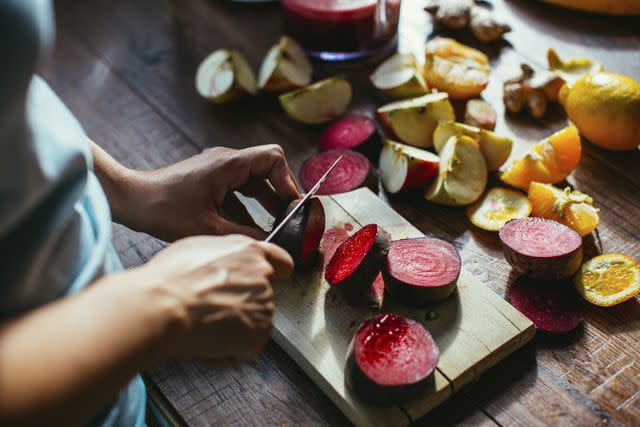The Health Benefits of Beets

Westend61 / Getty Images
Medically reviewed by Elizabeth Barnes, RDN
Beets are known for their slight heart shape, bright colors, earthy flavor, and the ability to stain everything in sight when sliced in preparation for a meal. They are full of essential vitamins, minerals, and plant compounds, many of which have medicinal properties.
This article covers the nutritional and health benefits, as well as the potential downsides, of eating beets. This information can help you determine whether adding beets to your diet is right for you and, if so, how to use them.

Westend61 / Getty Images
Beets Nutrition
Beets are a nutritious root vegetable that offers many health benefits. A 4-ounce (half-cup), or 85 gram (g), serving of sliced, boiled beets provides the following nutritional profile in grams, milligrams (mg), and micrograms (mcg):
Calories: 37
Protein: 1.4 g
Total Fat: Less than 1 g
Total Carbohydrates: 8.5 g
Fiber: 1.7 g
Total Sugar: 7 g
Calcium: 14 mg
Iron: 0.7 mg
Folate: 68 mcg
Manganese: 0.3 mg
Potassium: 259 mg
Magnesium: 20 mg
Vitamin C: 3 mg
In addition to these vitamins, minerals, and nutrients, beets are also high in antioxidants and plant compounds that offer anti-inflammatory properties.
Health Benefits of Beets
Beets are packed with nutrition and offer various health benefits. Let's look at what the science says about the benefits of eating beets.
Lower Blood Pressure
Some of the most well-studied bioactive (health-promoting) compounds in beets are called nitrates. When you consume dietary nitrates from foods like beets, your body converts them into nitric oxide, a compound that relaxes and dilates your blood vessels and helps lower your blood pressure.
This is important for heart health because having uncontrolled chronic high blood pressure is a known risk factor for developing heart disease.
Fights Inflammation
Eating beets may help your body respond to and manage inflammation (immune response to an irritant). Systemic (throughout-the-body) inflammation is a risk factor for various chronic diseases. Eating a diet rich in anti-inflammatory compounds is a lifestyle practice that can lower inflammation.
Beets contain pigments called betalains, which are studied for their ability to help reduce inflammation. One study found that when participants consumed 250 milliliters (mL) of beetroot juice daily for two weeks, they experienced a significant reduction in inflammatory markers.
Improves Digestive Health
It's important to support your digestive health as much as possible, as research shows that healthy gut bacteria are critical for overall health.
Eating a fiber-rich diet is one of the best ways to do this. Fiber is only found in plant foods, like beets. Surveys have revealed that most adults in the United States do not consume the minimum daily recommended amount of fiber of around 30 g.
You'll find around 2 g of fiber per half-cup serving of boiled, sliced beets. You can also enjoy cooked beet greens, which provide 2 g of fiber per half-cup (72 g) serving.
Supports Brain Health
The nitrates in beets support brain health. This is especially important as many mental functions naturally decline with age, but eating a nitrate-rich diet can offer protective benefits.
As the nitrates dilate and relax blood vessels to lower blood pressure, they also help increase blood circulation and oxygen transport to the brain. Some research has found that beet juice helps increase blood flow to the frontal lobe, the part of your brain responsible for working memory and decision-making.
Boosts Immune System
Eating abundant colorful fruits and vegetables, like beets, is a great way to support your natural immunity. Beets are full of antioxidants that help protect cellular health and anti-inflammatory compounds that benefit your immune health.
There's also evidence that some of the compounds in beets may have anticancer properties, suggesting that they benefit immune function.
Prevents Heart Disease and Stroke
Foods rich in dietary nitrates, like beets, help increase blood flow by widening and relaxing blood vessels. This helps lower blood pressure, and research suggests nitric oxide can reduce the risk of heart attacks and strokes.
Increases Stamina
Endurance athletes consume beets and beet juice to help increase their athletic performance and stamina. This is due to the effects of dietary nitrates and their conversion to nitric oxide in the body.
Evidence shows that nitrates help relax and dilate blood vessels, increasing blood flow and oxygen to your heart, brain, and other organs and tissues. Nitrates also support how efficiently your mitochondria (cells' energy source) function during strenuous activity.
The best effects occur when beets or beet juice are consumed within two hours of activity when blood nitrate levels peak.
Side Effects of Eating Beets
While beets offer various nutrition and health benefits, people with certain individual factors may need to avoid or reduce their beet intake. Overall, beets are healthy for most people.
If you're not used to eating beets, you may be surprised to find they turn your urine and bowel movements pink or red the next day, a phenomenon known as beeturia.
People with a higher risk of developing kidney stones may also want to limit their beet consumption. When oxalic acid (a plant-derived compound) levels are high, it can bind to minerals like calcium, leading to kidney stone formation among people who are more susceptible or have a history of kidney stones.
Related: What Are Kidney Stones?
Beet Benefits by Color
Beets consist of the root, usually red, purple, or yellow, and the appropriately named greens. Each color and part offers unique health benefits as follows:
Red and purple: These colors of beets are high in a type of betalains (pigments) called betacyanins. While all betalains are beneficial, betacyanins have the strongest antioxidant properties.
Yellow or golden: Beets of these colors also contain betalains, but they have betaxanthins instead of the red-colored betacyanins.
Beet greens: The greens of beets are edible, too, so don't throw them out. Like other dark, leafy green vegetables, beet greens contain nitrates and are high in beta-carotene, lutein, and zeaxanthin. These compounds are good for eye health and vision.
How to Eat Beets
You can enjoy beets in a number of ways and in both savory and sweet dishes. Before you eat beets, wash and peel them. If they have greens on them, you can remove these and consider eating them as well. Both the beet and its greens offer numerous health benefits.
Once washed and peeled, beets can be eaten cooked or raw. For cooked beets, slice or chop them and use cooking methods like roasting, boiling, steaming, or baking. You might choose to season and drizzle them lightly with olive oil or avocado oil before baking or roasting.
Explainer
For boiled beets, consider adding 2 tablespoons of lemon juice or vinegar to the boiling water to reduce their pigment from bleeding.
You can add cooked beets to smoothies, use them in chocolate cake recipes, blend them into homemade dips and sauces, serve them as a side dish, or add them to grain bowls or salads. You can grate or chop raw beets into matchsticks to use in things like salads, coleslaw, smoothies, or veggie burgers.
The simplest ways to prepare beet greens are by braising or sauteing them. Gently wash the greens in water to remove debris, and then separate the thick stem from the outer leaves and chop them before cooking on the stovetop with olive oil, onions, garlic, water, salt, and pepper. You can also chop raw beet greens and add them to any green salad mix.
Related: Eating 1 Cup of Green Leafy Vegetables Can Support Heart Health
Summary
Beets are a versatile food, full of vitamins, minerals, antioxidants, fiber, and other plant compounds responsible for various health benefits. Eating beets may help protect your heart health, reduce high blood pressure, support your endurance for workouts, and benefit your digestive system. People at a higher risk for calcium oxalate kidney stones may want to limit their beet intake, but otherwise, enjoy experimenting with these in slightly sweet and savory recipes.

